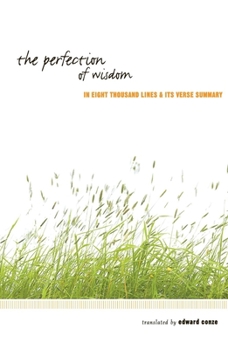The Perfection of Wisdom
Select Format
Select Condition 
Book Overview
After the Torah, the Koran and the Gospels, the Indian literature of The Perfection of Wisdom has had the greatest impact on the religious consciousness of mankind. Its composition extended for over seven hundred years, and here we offer the reader the first two works which were composed in South India between 100 B.C. and A.D. 100.
These documents are not only indispensable to those who wish to undersand the mentality of the East, they still carry a potent spiritual message; and those who desire to diminish their personal worries by the disciplined contemplation of spiritual truths could make no better choice.
. . .Finally one could also threat them as spiritual documents where are still capable of releasing spiritual insights among people separated from their original authors by two thousand years and vast disparities in intellectual and material culture. There is, however, a certain absurdity about interpreting spiritual matters in the abstract and in general terms, since everything depends on concrete conditions and the actual persons and their circumstances. Some will regard this literature as rather strange and alien, and may long for something more homespun. They will, I hope, allow me to retort with a remark that so endeared me to my students at Berkeley. Asked what Buddhism should do to become more acceptable to Americans, I used to enumerate with a smile a few concessions one might perhaps make respectively to the feminist, democratic, hedonistic, primivistic and anti-intellectual tendencies of American society. Though in the end I invariably recovered my nerve and reminded my listeners that it is not so much a matter of Dharma adjusting itself to become adaptable to Americans, but of Americans changing and transforming themselves sufficiently to become acceptable to the Lord Buddha. --Edward Conze, translator, preface.
Edward Conze (1904-1979) was an Anglo-German scholar best known for his translations of Buddist texts.






